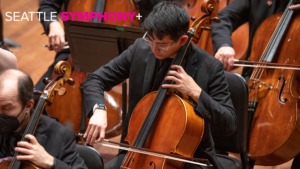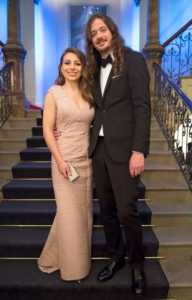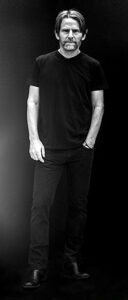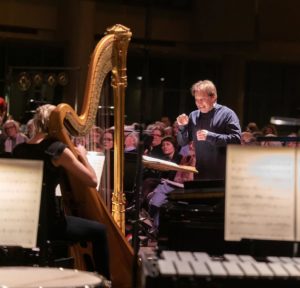
Seattle Symphony has unveiled its 2023–24 season, replete with familiar repertory (including The Messiah, Bach’s St. John Passion and two Beethoven and Mahler symphonies), plus family concerts, holiday and community events, pop/Hollywood-style programs ranging from Disney and Harry Potter to Joe Hisaishi and David Bowie, and a bevy of blue-chip soloists and guest conductors (Lang Lang, Emanuel Ax, Joshua Bell and Marin Alsop among them). Thomas May has aptly summarized the season’s overall shape and scope, so I’ll focus on its contemporary music offerings, an area where the announced lineup is something of a disappointment.
With no Music Director to provide a coherent vision (the position has been vacant since Thomas Dausgaard’s abrupt resignation in January 2022), and with staff turmoil leading to the departure of Elena Dubinets (the executive behind most of its recent commissions and initiatives, now decamped to LPO) and the discontinuation of the acclaimed [untitled] series (which showcased genres other than conventional orchestral works), the Symphony’s new music programming has become unfocused, even lackluster, with no major commissions forthcoming in the 2023–24 season, nor any mainstage events comparable to 2022’s Buddha Passion, 2019’s Surrogate Cities or 2015’s unveiling (and premiere recording) of the critical edition of Ives’ Fourth Symphony. And although next season’s calendar boasts dozens of 21st century compositions, many of them are in the mold of the mandate-fulfilling, stylistically-inoffensive short works that have become commonplace on North American orchestra programs.

Nevertheless, there are several highlights to look forward. And what follows is an opinionated listing of some of them:
- Dalia Stasevska (a successor to Osmo Vänskä as chief conductor of the Lahti Symphony Orchestra) returns to the mainstage to conduct her husband Lauri Porra’s Entropia Concerto for Electric Bass, with Sibelius and Anna Meredith also on the program. Porra is a crossover artist who could be regarded as a Finnish counterpart to someone like Edgar Meyer. He’ll also appear at the Symphony’s Octave 9 space in a chamber work called Cabins & Hideouts. All of these events will be in mid-November
- Conductor David Robertson, who has an impressive new music pedigree (he was the first American to serve as Ensemble Intercontemporain’s music director), has written a new piano concerto for his other half Orli Shaham. They’ll perform it two weeks after the Porra events, along with Lydia Tár’s favorite Mahler symphony
- Speaking of Vänskä, he’s slated to return in March—not, alas, to conduct Sibelius. But alongside the scheduled Tchaikovsky and Prokofiev warhorses, his program will include an interesting—and as-yet unrecorded—piece by the Korean-born, London-based Donghoon Shin. Despite its Steinbeck-alluding title, Of Rats and Men, its inspiration comes from Kafka and Bolanõ. In April, Vänskä will premiere another Shin composition (this one inspired by Yeats) with the Los Angeles Philharmonic
- Alisa Weilerstein arrives to perform Lutosławski‘s Cello Concerto, which might well be his most underrated work, and one in which he rather uncharacteristically establishes an oppositional, dialectic relationship between soloist and orchestra (personal note: many years ago as a student at USC, I played in the Concerto‘s West Coast premiere with Gabor Rejto as soloist)
- Another April 2024 event features Ralph Vaughan Williams’ often-recorded but rarely-performed Sinfonia Antartica, which the composer adapted from his soundtrack to the 1948 feature film Scott of the Antarctic. This seventh of Vaughan Williams’ nine symphonies is perhaps the least admired of the lot (aside from the non-canonical A Sea Symphony, which is more of an oratorio), often inhabiting an uncomfortable no man’s land between program music and symphonic ambitions. But it’s also one of Vaughan Williams’s most colorful scores, featuring wind machine, organ, and a Sirènes-style women’s chorus. In the manner of last season’s presentation of Messiaen’s Des canyons aux étoiles, the music will be accompanied by a multimedia presentation featuring journal entries and photographs from Scott’s doomed 1910–13 expedition

The Symphony’s diminutive Octave 9 space will continue its newfound and successful scheme of double Friday night recitals (at 7 PM and 9 PM), which in addition to the aforementioned Cabins & Hideouts event, will include the following:
- Hub New Music, the Boston-based quartet whose instrumentation duplicates that of the fondly-remembered Seattle Chamber Players (flute, clarinet, violin, cello), will perform on October 6, with a program featuring a world premiere by Nina C. Young, an experimentally-oriented composer who now teaches at USC, along with works by Daniel Thomas Davis and Angélica Negrón
- February 2 will bring Steven Mackey’s Memoir, scored for string quartet, a pair of percussionists and a narrator. Premiered in May 2022, it’s a theatricalized setting of an unpublished memoir written by Mackey’s late mother (who was also the subject of his violin concerto Beautiful Passing, recently featured on Flotation Device via its premiere recording conducted by David Robertson—if only he would bring that to Seattle!). Mackey is a rock guitarist who got involved in instrumental composition through the influence of the Downtown New York improv scene and the broader international avant-garde—something of an American counterpart to Heiner Goebbels or Steve Martland. His music is often quite engaging in its unexpected juxtapositions of styles, but it can also drift into sentimentality, so I’ll be interested to see where in that spectrum this as-yet unrecorded work falls

After Morlot’s final [untitled] concert in 2019, I noted how dramatic and reinvigorating his tenure had been for the Symphony, how this “exceptionally charismatic and personable conductor” had “succeeded beyond all expectations at winning the hearts and minds of the city”. Today, Seattle desperately needs another agent of musical rejuvenation. Something that’s not easy to find—but no other musical institution in the region can match the Symphony for prestige, reach and built-in resources. And so as its Board and administration continue their secretive search for the next Music Director, undoubtedly preparing to audition visiting conductors as candidates in the coming season, one can hope that enough hard lessons have been learned, and enough organizational agility regained, that dreams of Emerald-tinted musical splendors will include not just those in the past, but those yet to come as well.
